A new business normal seems to be emerging in the post-pandemic world, affecting consumer perspectives and multiple industries at once.
The IBM Institute for Business Value (IBV) has been conducting continuous research to understand all the changes ahead. I would like to share some insights taken from three of our research papers, and shed some light into:
- New consumer perspectives
- Key actions for business executives
- How we break through the business decision-making impasse
Consumers are dealing with a trilemma of tradeoffs
IBV has conducted regular surveys of more than 54,000 respondents in the United States during the great lockdown. In August, we extended the exercise to cover a global population representing more than 60 percent of the world’s reported cases and deaths.
We have realized that much of the pandemic has turned into a shared experience involving a trilemma of concerns. People around the world are worried about their: (1) personal health and safety; (2) economic future and job security; and (3) individual privacy and liberty. To gain deeper insight into the tradeoffs—preventing sickness, growing the economy, and protecting privacy— IBV gave respondents three pair-wise comparisons and asked them to indicate which of the factors was relatively more important for leaders to consider.
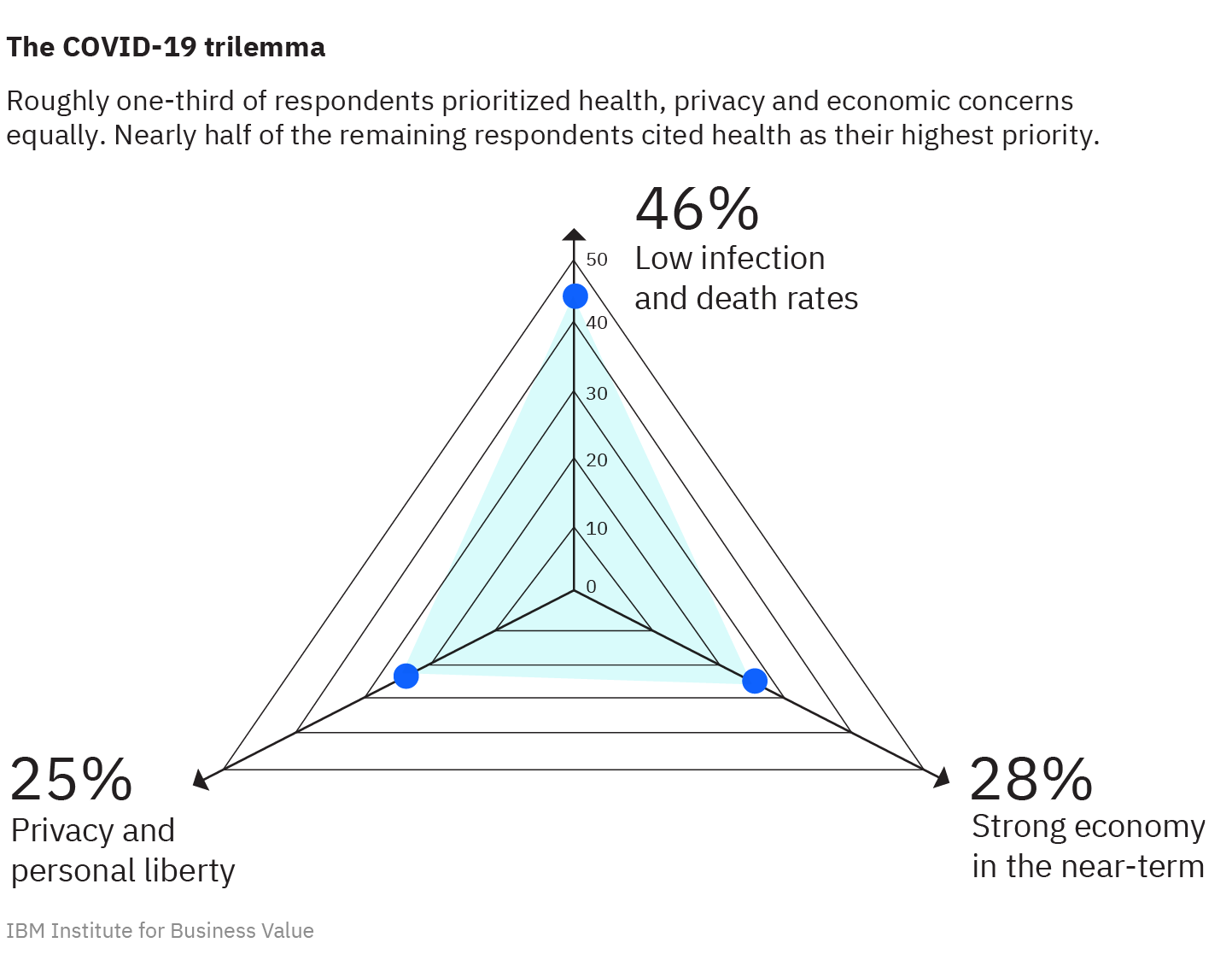
Looking at how people responded in the US when asked to make a direct tradeoff about the relative importance between low infection and death rates and a strong economy in the near-term, more than 40 percent selected health, while more than 20 percent selected the economy or privacy and personal liberty. These choices have so far remained consistent
Ongoing concerns about the impact of the coronavirus also remain very real. When it comes to return-to-work strategies, our survey reveals a disconnect between employers and employees across most industries.
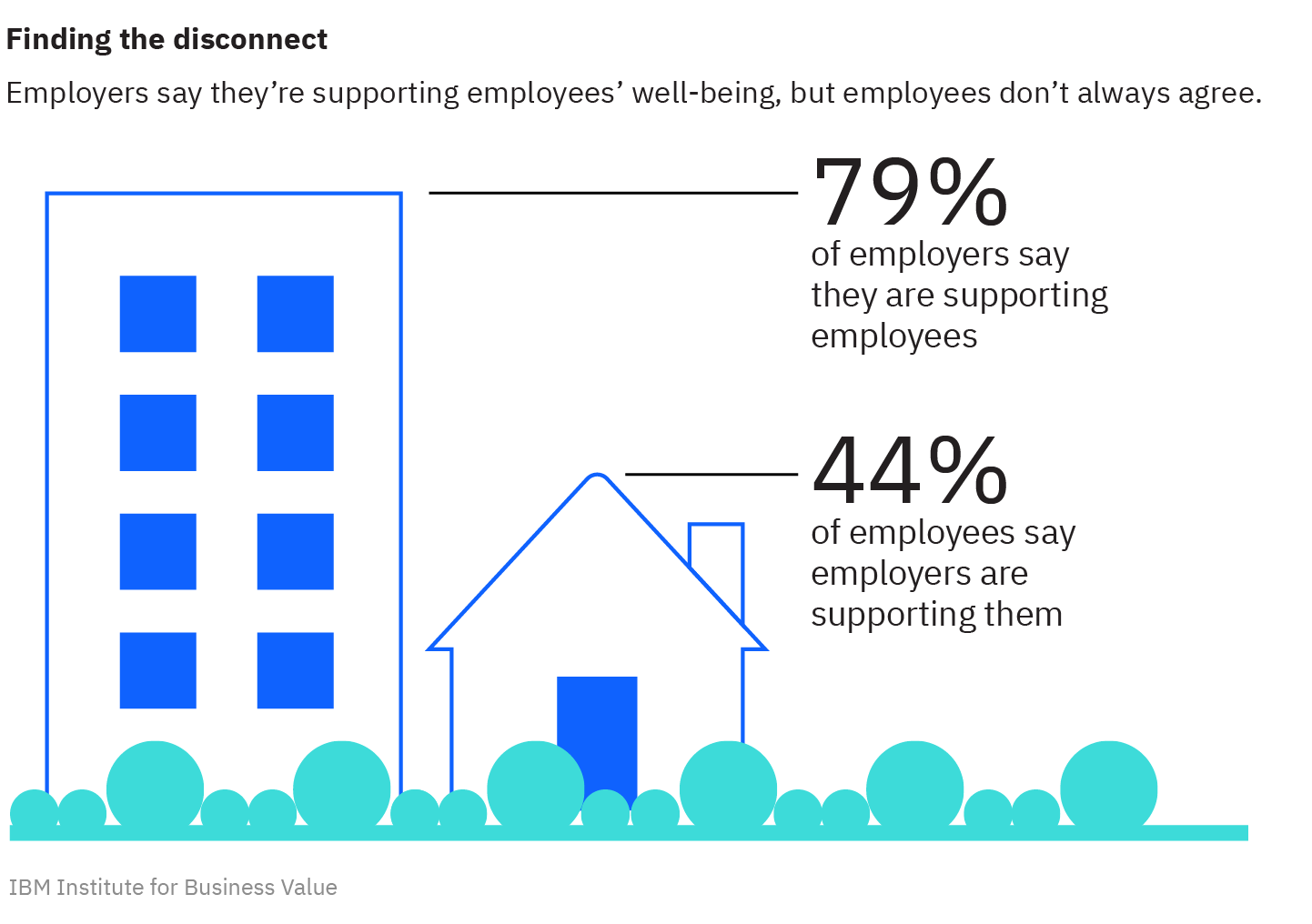
Interestingly, 79 percent of employers say they are adequately supporting the physical and emotional health of the workforce, while only 44 percent of employees say the same.
While employers received mixed reviews on how they’re handling the pandemic, there is one thing they could do that would appeal to most employees: continue to offer the option to work from home.
Prior to the lockdown, only 10 percent of individuals indicated they were working from home. By July 2020, that percentage had quadrupled to nearly 45 percent.
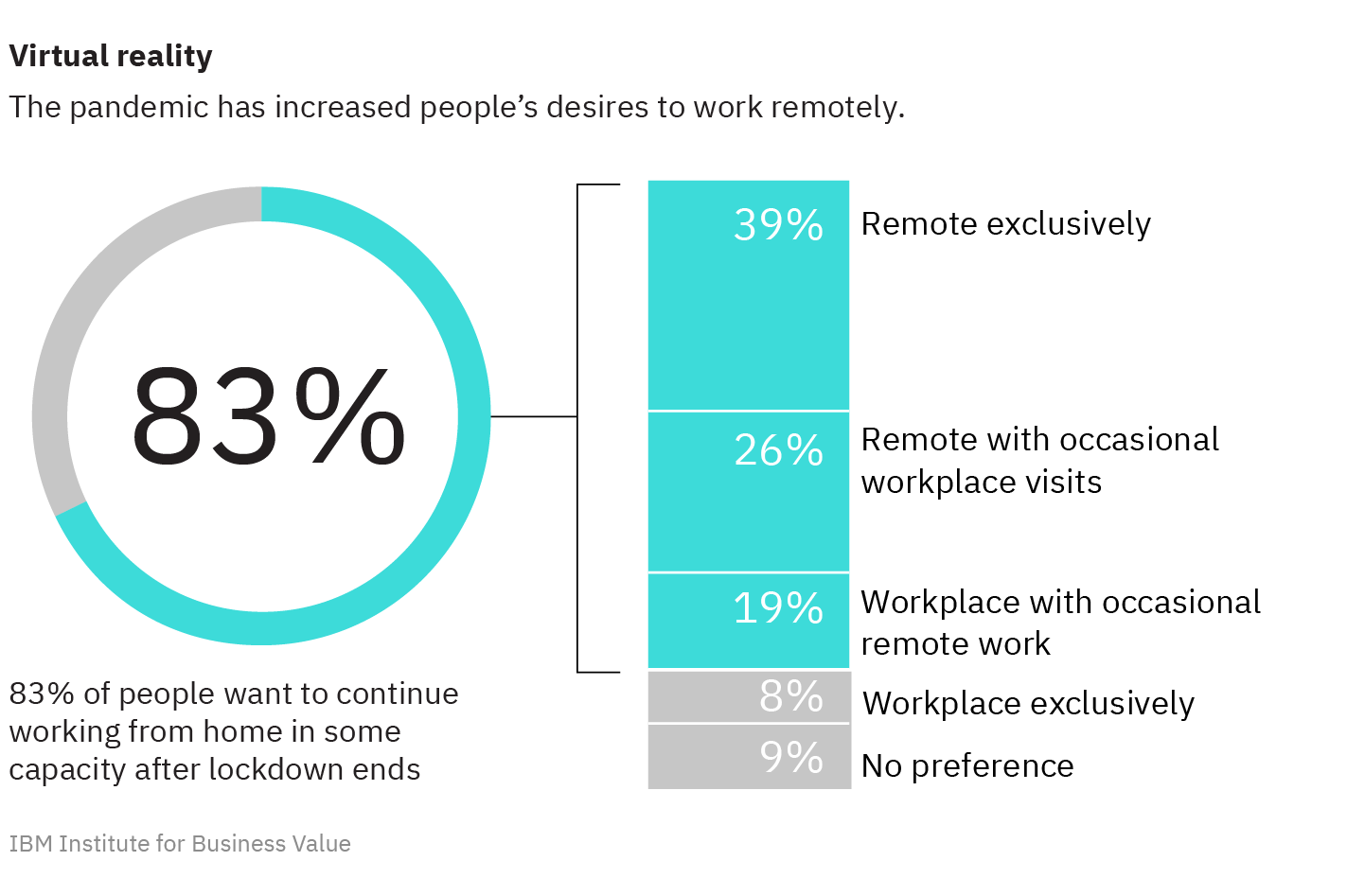
Of those currently working remotely, 83 percent indicate they would like to continue to work away from the office at least occasionally, while 58 percent would like this to be their primary way of working.
In fact, of those individuals who are now working remotely full-time, only one in ten say they want to return to their workplace.
Emerging stronger to a different normal
Even though each day brings more uncertainty, there are definitive actions that can improve business resilience and strength in the post-pandemic environment.
IBV research has revealed a framework that outlines a path forward, organized around seven key imperatives that will be useful for any organization’s executive team. Consider this guide as a checklist.
The first imperative is for talent leaders and Chief Human Resources Officers (CHROs) to empower a remote workforce. Executives should consider a full revision of their strategy and policies to support remote and distributed work, with specific guidance and rules in place. Communication is key. Be aware that what leaders think they’re communicating isn’t always being perceived the way it’s intended. Our research shows that 74 percent of executives say they are currently helping their employees learn to work in new ways, yet only a third of surveyed employees said the same: that’s a 36-point gap. Clearly, feedback loops need to be built into all interactions.
The second imperative is for Chief Marketing Officers (CMOs) to engage customers virtually. In this pandemic, service centers have been swamped with massive call volumes. Exponential demand can be met by the exponential power of digital tools. Virtual engagement with clients and partners will remain a core part of doing business, even as we reestablish face-to-face interactions.
The third imperative is for Chief Technology Officers (CTOs) and Chief Information Officers (CIOs) to provide remote access to everything. When shelter-in-place orders were issued, uncomfortable questions arose for many businesses, such as how to transition overnight from existing models to virtual ones. Fortunately, as a tech-at-its-core business, IBM was already configured to operate in this way. But for many organizations, the question has been, “can-we-do-this?” CTOs and CIOs need detailed business continuity plans that make the most of digital technologies to create operational resilience and flexibility.
The fourth imperative is for Chief Operations Officers (COOs) to accelerate agility and efficiency. The solution lies in the immense benefits of cloud-native capabilities. Organizations embracing public and hybrid cloud are already using this crisis as an opportunity to emerge stronger, better, and more resilient.
The fifth imperative is for Chief Information Security Officers (CISOs) to protect against new cybersecurity risks. As more workloads and users move to cloud operations, accelerated by the current work-from-home requirements, cybersecurity resilience will evolve from a baseline performance requirement into a driver of a competitive advantage. What began as extraordinary will become systemic.
The sixth imperative is for Chief Financial Officers (CFOs) and Chief Supply Chain Officers (CSCOs) to reduce operational costs and enhance supply chain continuity. The ability to generate granular, real-time data about supply chains has gone from nice-to-have to necessity. Volatility has become hyperlocal, with excess inventory in one city and dire need in another.
The seventh imperative is for Chief Medical Officers and public sector leaders support health providers and government services. It’s become critical to expand the use of human-centered technology interfaces, to help those racing to find the right treatments, vaccines, and cures, as well as to help manage physical, mental, and economic health. Developing a sophisticated strategy that combines the strengths of humans and machines will also be central in preparing for the effective re-integration of newly remote teams across these areas and industries—and across the economy and society, as well.
Organizations can invest now to expedite COVID-19 recovery
So then, how should companies finance these actions now to expedite post-pandemic recovery?
The pandemic has thrown organizations into crisis mode, with respondents reporting all business capabilities growing in importance. Asked about the most pressing of those priorities, C-suite executives ranked “workforce safety and security” number one, closely followed by crisis management. But right after that came familiar concerns: cost management and cash flow management.
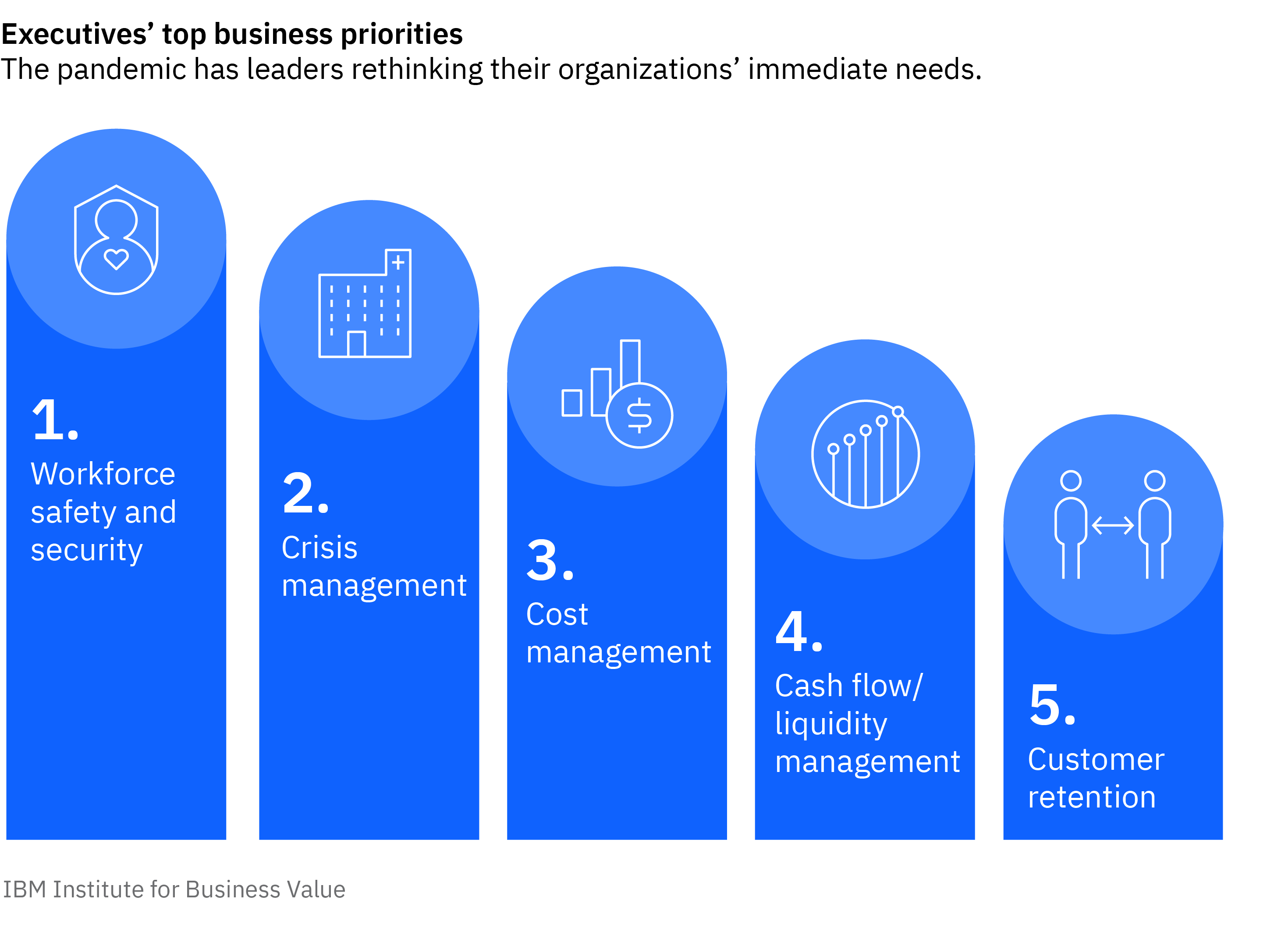
A central theme in the search for cost efficiency is the question of investment and ownership, or capital expenditure (CapEx) versus operating expenditure (OpEx). A valuable business approach would be to Invest the right way: CapEx with a technology twist.
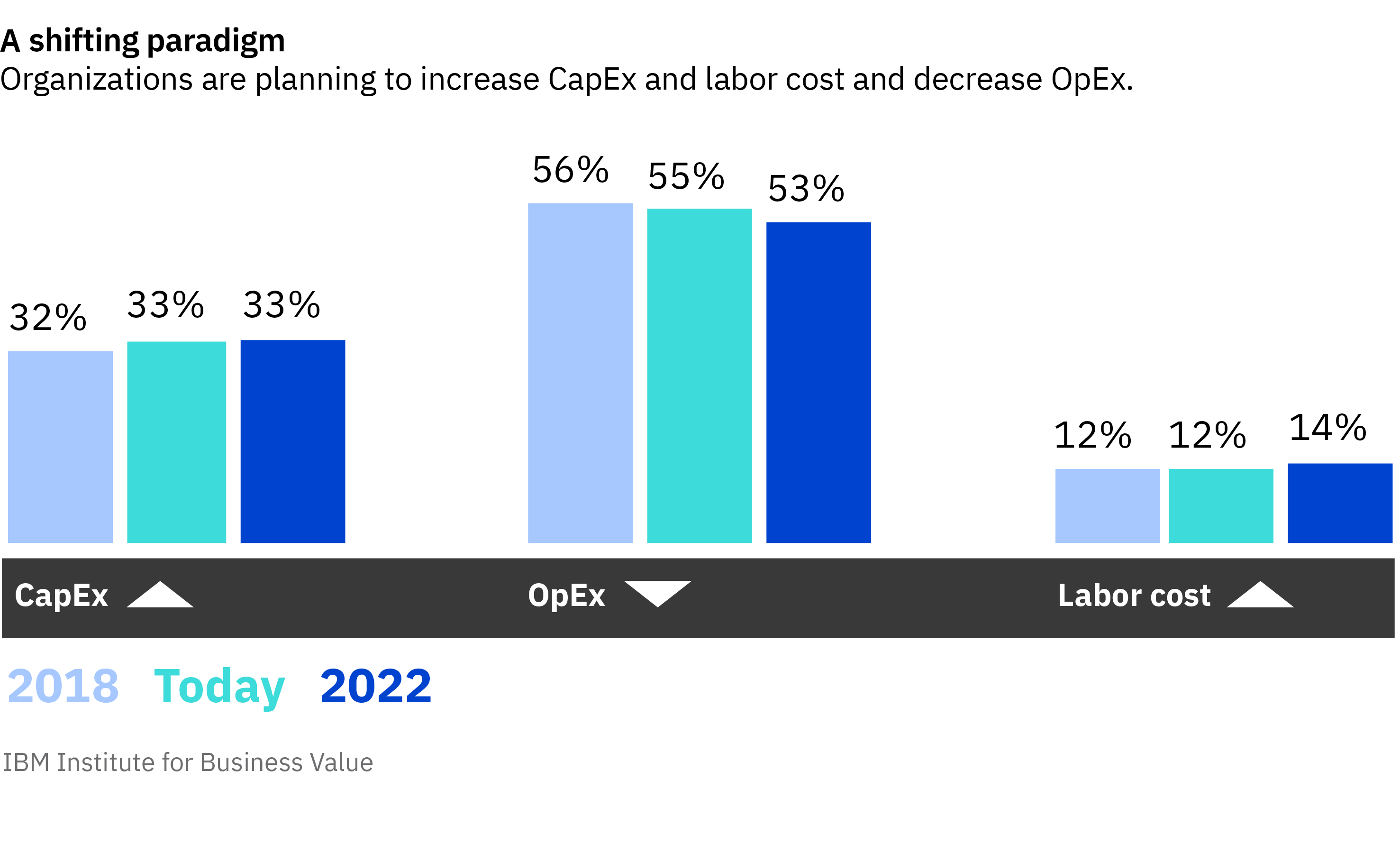 In the course of the crisis, executives have come to realize an aspect of ownership that has been under-appreciated for a long time: it increases independence and buffers against outside shocks. Consequently, in a reversal of the OpEx shift paradigm, executives state they plan to increase CapEx and decrease OpEx, with Cloud and AI at the top of their priority list.
In the course of the crisis, executives have come to realize an aspect of ownership that has been under-appreciated for a long time: it increases independence and buffers against outside shocks. Consequently, in a reversal of the OpEx shift paradigm, executives state they plan to increase CapEx and decrease OpEx, with Cloud and AI at the top of their priority list.
The principle of the Honorable Merchant
To conclude, as the world faces a new normal, we’re seeing a fundamental shift that corresponds to the principle of the Honorable Merchant. What is it? It’s a historically rooted model of operating a business in Europe. The principle prizes prudent accounting and operating, and responsibility toward the enterprise and all of its stakeholders, including society and the environment. IBV survey data shows that the ideals of the Honorable Merchant are returning to executive thinking: an unexpected positive outcome of this crisis.
Meet the author


